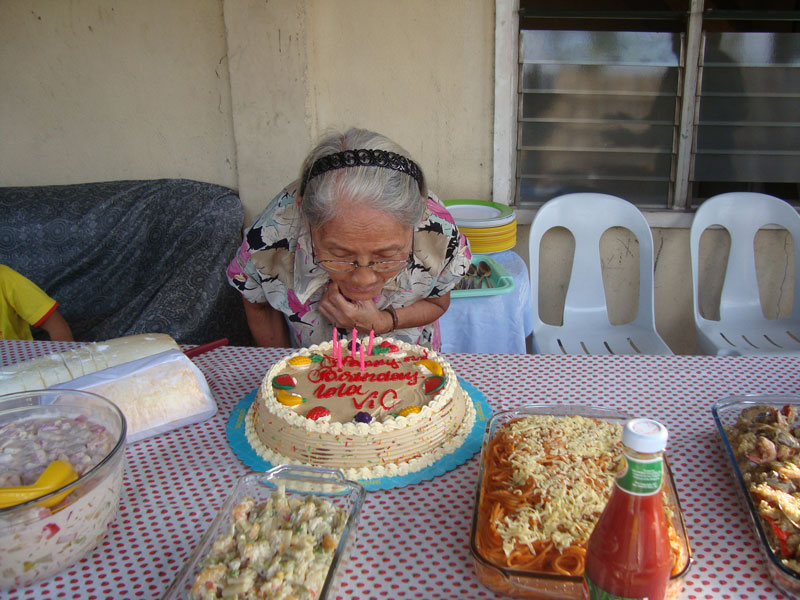Misyon Online - January-February 2013
Pulong ng Editor
Courage to live a Lent
By Fr Warren Kinne
A Lenten reflection from an Australian Columban who spent many years in Mindanao. Ash Wednesday falls early this year, on 13 February. Easter Sunday falls on 31 March. The article originally appeared in The Far East, the Columban magazine in Australia and New Zealand, in March 2012.
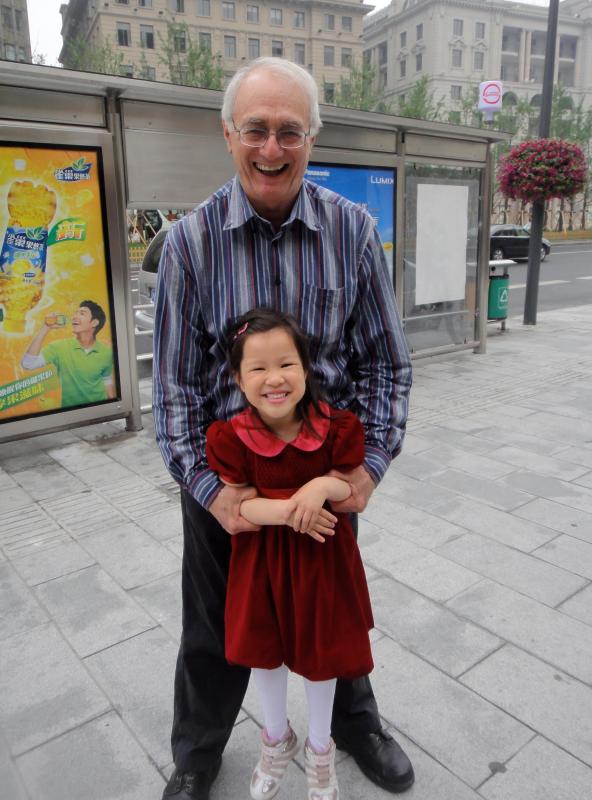
Fr Warren Kinne with Xiao Ai
Before the great Feast of Easter when we celebrate the death and resurrection of Jesus, the Church goes through a period of preparation by prayer and fasting. We call this Lent. In the northern hemisphere, where Christianity started, it was celebrated in spring and slowly, throughout that time, the dead of winter burst forth into the luxuriance of new growth, signifying life and the resurrection.
An Ordeal - then a Miracle
By Beth Sabado
Ask and it will be given to you; seek and you will find; knock and the door will be opened to you. For everyone who asks, receives; and the one who seeks, finds; and to the one who knocks, the door will be opened (Matthew 7:7-8).
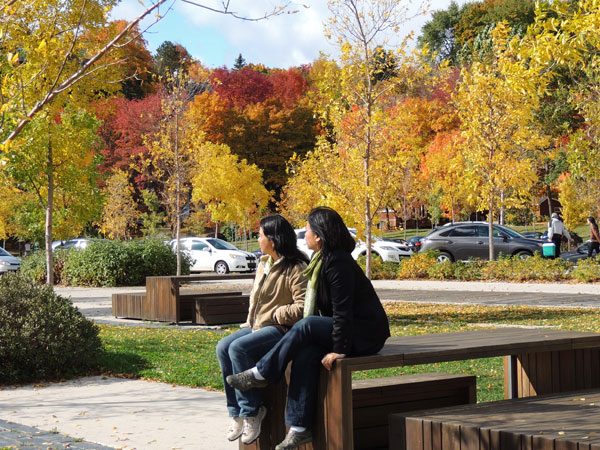
Marveling at the beauty of God's creation with my cousin Marley.
I was granted a single entry visa to Canada, all we needed to fulfill the plan to drive Montreal and Quebec City. This was a post-birthday present from my sister Gondee and her family, an unexpected yet highly appreciated opportunity to be with my cousin Marley Dacanay who used to be a Columban Lay Missionary in Taiwan. Marley is now a Lay Associate of the Foreign Missions Society, formerly Prêtres Missions des Étrangères (PME), and was preparing to leave for Brazil the Tuesday afternoon we arrived. We were amazed at how our visit came just in time to give her our family support. We felt nothing but wonder at the very favorable weather, the breathtaking scenery, as it was the peak of the autumn foliage. We also became the beneficiary of a free parking pass for a day to the most coveted parking area in Old Quebec City from a stranger. Our hotel accommodation was also beyond our expectation; everything was working out for us!
When I pray the Our Father
By Maira San Juan
Maira San Juan is from Taytay, Rizal, near Manila, and worked as a Columban Lay Missionary in Korea from 2007 till the end of 2012.
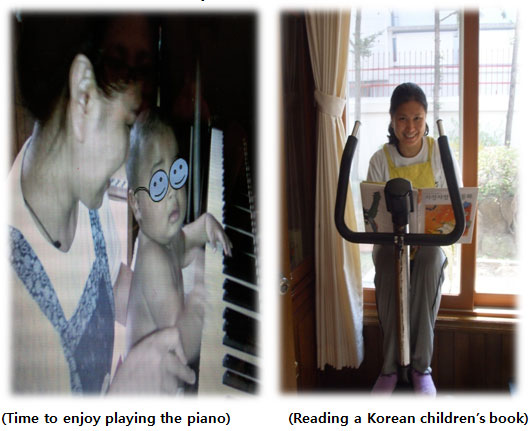
It’s been five years since I arrived in Korea as a Columban Lay Missionary from the Philippines. Within my nine months of language study I have been immersed in ministry with a community of persons with AIDS. On my first day there I felt a mixture of excitement and fear: excitement because it was my first time meeting people living with HIV and I was curious to know how they were coping after learning that they were HIV-positive; fear because at the back of my mind I was thinking I might get the HIV virus through them since we ate at the same table, used the same toilet, talked to each other and so on. But through the years I have been with them, my thinking and feelings have changed, not only about them but also about life, about people, about me and about God. Being a missionary involved in AIDS ministry has helped me to grow not only as a person but also as a woman called by God to be a part of his mission. Throughout my journey, the prayer that has helped me and acquired a new personal meaning is the Lord’s Prayer.
VICTORIA MALACAPAY ANDAS: A Catechist to the End
By Jayson B. Arcamo
The author, who is based in Bacolod City, works full-time with the Columban Mission Office.

Victoria Malacapay Andas was born on 30 September 1929 in Binalbagan, Negros Occidental, and died on 11 August 2012. She was eighth among the ten children of Justina Rojas Malacapay and Remegio Libo-on Andas who were both public school teachers during the time of Maestro Emong (Geronimo Abada Sr.), the first district supervisor of Kabankalan.
Victoria, while still in high school, started helping her sister Milagros to teach catechism in the Flores de Mayo after World War II. Padre Juan Garcia was the parish priest at that time. She wanted to become a religious sister and joined the Sisters of Charity. After a year as a novice she had to leave for health reasons.
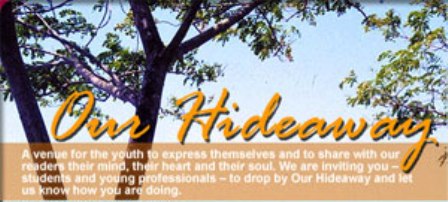
A ‘Pilgrimage of Life’
A reaction paper by Mitch Owen Gil G. Ledesma
The author is studying Medical Technology at Colegio San Agustin, Bacolod City (CSA-B).
This year we celebrate the Year of Faith. Because of this we had a ‘Pilgrimage of Life’ on Saturday 1 December 2012. A pilgrimage is a journey of grace, it a spiritual journey of faith towards God. Pope Benedict XVI began his apostolic letter Porta Fidei, announcing the Year of Faith, with these words: The ‘door of faith’ (Acts 14:27) is always open for us, ushering us into the life of communion with God and offering entry into his Church . . . To enter through that door is to set out on a journey that lasts a lifetime’. The ‘Pilgrimage of Life’ made me ask how strong my faith in God is and what I must do in order to serve Him.
During the pilgrimage we visited many churches here in Negros Occidental and I learned a lot about their history. One example is San Isidro Labrador Church in Binalbagan. I learned that that was where the Augustinian missionaries first planted the seed of Christianity and that San Isidro is the Patron of Laborers, a true model of hard work.
‘Pilgrimage of Life in the Diocese of Kabankalan’
A reaction paper by Maria Gezell T. Taborada
The author is studying Medical Technology at Colegio San Agustin, Bacolod City (CSA-B).
A pilgrimage is a journey to the door of faith. It is a search of moral and spiritual significance. Typically, it is a journey to a shrine or other location of importance to a person’s belief and faith, although sometimes it can be a metaphorical journey into one’s own beliefs.
When I heard about our department’s ‘Pilgrimage of Life’ I was bothered much. Should I join? What popped into my mind was that if I didn’t I’d attend my NSTP (National Service Training Program) class and perhaps regret not joining. But my apprehension was wrong. The pilgrimage was fun and exciting, the day extremely wonderful and worth it.
May God, the source of hope, fill you with joy and peace in the faith, so that your hope may increase by the power of the Holy Spirit (Christian Community Bible).
~ Romans 15:13 ~
Now, a new creature, I in Christ am born,
The old man stripped away; -- I am new-made;
And mounting in me, like the sun at morn,
Love breaks my heart, even as a broken blade:
Christ, First and Only Fair, from me hath shorn
My will, my wits, and all that in me stayed,
I in His arms am laid,
I cry and call –
‘O Thou my All,
O let me die of Love!’
~ Blessed Jacopone of Todi, Franciscan poet (1230 – 1306) ~
Pulong ng Editor
Pulong ng Editor
By Fr Sean Coyle
An Ordeal - then a Miracle
By Beth Sabado
Ask and it will be given to you; seek and you will find; knock and the door will be opened to you. For everyone who asks, receives; and the one who seeks, finds; and to the one who knocks, the door will be opened (Matthew 7:7-8).

Marveling at the beauty of God's creation with my cousin Marley.
I was granted a single entry visa to Canada, all we needed to fulfill the plan to drive Montreal and Quebec City. This was a post-birthday present from my sister Gondee and her family, an unexpected yet highly appreciated opportunity to be with my cousin Marley Dacanay who used to be a Columban Lay Missionary in Taiwan. Marley is now a Lay Associate of the Foreign Missions Society, formerly Prêtres Missions des Étrangères (PME), and was preparing to leave for Brazil the Tuesday afternoon we arrived. We were amazed at how our visit came just in time to give her our family support. We felt nothing but wonder at the very favorable weather, the breathtaking scenery, as it was the peak of the autumn foliage. We also became the beneficiary of a free parking pass for a day to the most coveted parking area in Old Quebec City from a stranger. Our hotel accommodation was also beyond our expectation; everything was working out for us!
St André Bessette CSC, a lay brother of the Congregation of Holy Cross, was born on 9 August 1845 in Mont-Saint-Grégoire, Quebec, made his final vows on 2 February 1874, died on 6 January 1937, was beatified on 23 May 1982 and became Canada’s first male saint on 17 October 2010. It was largely his devotion to St Joseph that led to the building of the Basilica which Beth Sabado visited.
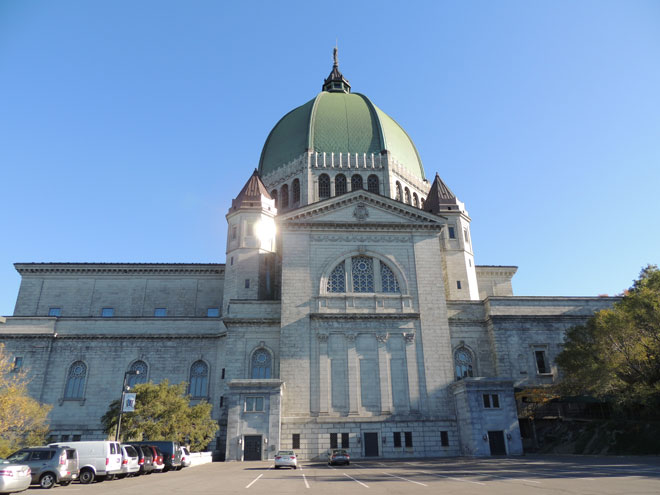
We were visiting St Joseph’s Oratory in Montreal prior to a lunch appointment with Marley and the Quebec Foreign Missionaries, as the group is also known, when we found that our car window was broken and my personal items (credit card, passport, IDs from Hong Kong and Taiwan, health card, driver’s license, cash, Columban Personnel Directory, smartphone, etc) were all missing. The initial shock was quickly overcome through the support of strangers around us and our collective sense of gratitude and awareness that things could have been worse. Thankfully, my laptop was in the trunk.
We filed an incident report with the church security but our request to review the surveillance video wasn’t granted. We called the police but they could not come to the scene and advised us to proceed to the nearest police station and file a report. Right there and then I notified MasterCard to cancel my account. This gave me some sort of control. As instructed by the police, we attempted to file for a consideration with the US and Canadian embassies but options were very few because it was Thanksgiving Day in Canada and Columbus Day in the USA, both holidays.
Marley's Superior General, Fr Guy Charbonneau, was so supportive and got in touch with the police and the rector of St Joseph’s Oratory. I felt so violated and naked, stripped of my identity, devastated beyond words. But an overwhelming sense of peace possessed me as my sister assured me that God saw all this. I must admit that I have at times judged her tendency to pontificate, but this time all I could hold on to was my faith. I had nothing to lose if I abided by her strong belief in the power of positive thinking!
A few hours later we went back to the place of the incident hoping for some encouraging development, but there was none. In the meantime, we contacted the US Embassy. The person on call was very patient but couldn’t offer any resolution. My situation as a foreigner holding a Philippine passport, with a B1B2 visa for the USA, working in Hong Kong and currently on a single entry visa to Canada, was so complicated. It would be impossible to re-enter the US. It would take significant time and resources to have my status reinstated.
I was advised to arrange for a flight from Canada to the Philippines and start the visa proceedings all over again. My sister acknowledged this suggestion of the US Embassy official and expressed confidently, ‘All we can count on now is Divine Intervention’. I was reminded of the migrant workers whom I journeyed with in Taiwan in undergoing the deportation process. I uttered a prayer, ‘God, do you want me to experience the same so I will be better equipped in assisting them?’

The car with the smashed window
I was very aware that I needed to secure my important papers and personal belongings. I blamed myself for being so irresponsible by leaving my important stuff in the car. But my sister reminded me to be gentle with myself. Her support and understanding and that of my family gave me permission to forgive myself, the only ‘treat’ I could give myself at that difficult time. Yes, I had my moment of stupidity. I hated it but there was nothing I could do. I had nothing to prove my existence except for a scanned passport and IDs sent in my personal email and saved in a folder a few years ago. I wasn't totally stupid after all, I thought, attempting to console myself.
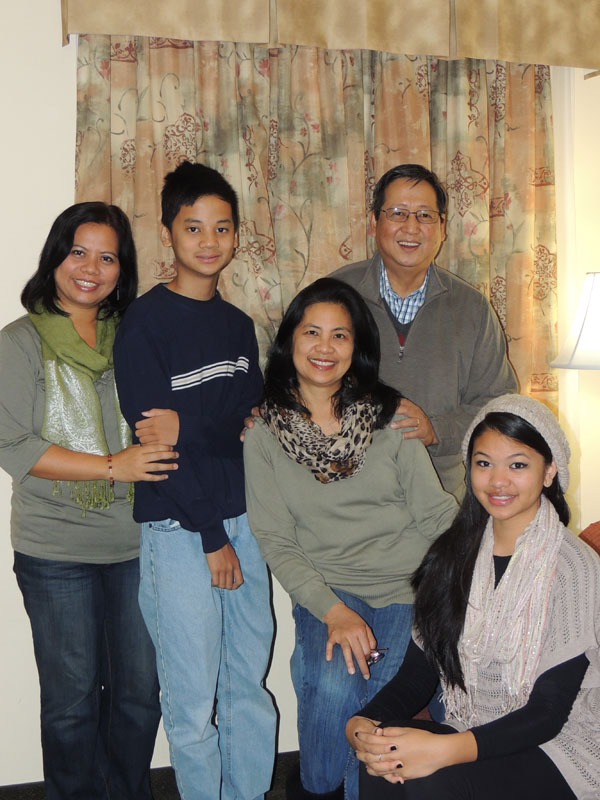
with my sister Gondee and family.
Marley's community graciously offered to accommodate us for the night. Meeting all the lovely people there, hearing their words of comfort, assurance of prayers and empathy added to my sense of peace and hope. As we settled in for the night, my sister's family experienced a taste of missionary life, the simplicity of our rooms, the dining hall routine and so on.
There was nothing I could do but pray, pray and pray. I cannot describe the peace and serenity but I believe it was a moment of grace for me and my family and brought us onto our knees together. I was deeply moved by the prayers uttered by my niece and nephew. They were asking God to touch the hearts of the people involved. They were praying for their conversion. I experienced some conversion as well.
Before retiring for the night, I managed to make contact with co-workers and changed all my internet passwords. As I checked my inbox one more time, there was a message from a stranger: Hi, I think I have found your phone in Westmount Park (Montreal) today Monday. The phone is still working perfectly. It seems you are an Asian . . . from the pictures, Filipina? Are you still in Canada? I would gladly give the phone back to you. I couldn't believe it! I was shaking and crying.
My sister said that this would start a series of fortunate events! Was this a gimmick, fraud or real? These thoughts came to mind . . . I ‘of little faith’! It was late when I read this man’s email. I tried reaching him on the number he provided but I presumed he was already asleep. I wasn’t sure if it was right but I left a message providing all our contact numbers in Canada. Then my niece said, ‘Let us google the park’. ‘And let us check this person on Facebook’, my sister added. And so we did. This gave us more hope and we managed to get some sleep.
I woke up early feeling rested and hopeful. I used the time to organize the address of the embassies to visit that day, including the Philippine Consulate in Ottawa, three hours from Montreal. My sister came into my room with a suggestion. ‘Let’s go to the park. Probably the robbers threw your other stuff away there.’ I was silent for few moments before agreeing.
While having a quick breakfast, my sister received a text message from the stranger who claimed to have found my phone and arranged a time for us to meet. My sister asked him how he had found my phone. He said that his son, whom he had taken to the park to play, had found it under a bridge over a dry creek in the park. I was suspicious. Yet I wanted to believe. ‘He’s a family man’, I thought . . .
You may call it a desperate move but I call it prompting and so we headed off to Westmount Park. As we arrived, a garbage truck passed by and I thought that the garbage collection had been done. My sister and I put on gloves and started to search every garbage bin in sight, opening each lid, lifting each bag from the bin, until we reached the place where ‘our lead’ said the phone had been found. As we went from bin to bin my sister kept reminding me that this was going to be a great article. ‘All for His glory’, she said!
I felt the throbbing of my heart. I felt that our ordeal would end. I saw a garbage bin outside a rest room on a hill in the park. I think it was our sixth or seventh. As we lifted the lid, I saw golden trimming covered with all sorts of rubbish. I recalled that my bag – a gift from one of the Columban supporters in Los Angeles - had golden trimming.
I realized that it was indeed my beige bag. My hands and whole body were shaking. I was crying joyfully. My sister was crying too but being a typical photo-lover wanting to document every move, managed to take a photo of me examining the contents of the bag. But I didn’t mind at all. ‘It's for your article’, she insisted!

A treasure found . . .
Holding the unzipped bag more tightly, I saw my Columban Personnel Directory – we call it the ‘Green Book’ - appearing, my passport beside it. It was intact. My wallet containing my IDs and cash was gone but who cared. I got what I needed, my passport!
As I related my ordeal to a friend, he commented, ‘It is terrible that they treated your passport like rubbish. In Asia it could generate a huge amount of money for forgery’.
God is good and God is so faithful. In less than 24 hours, we had found what we had been searching for. We met ‘our lead, our angel’ afterwards in his office. As he handed me my phone, I felt so blessed to have been chosen to experience all of this. As we expressed our appreciation, he simply replied, ‘It is just natural to help’. God bless him!
We couldn't have arranged things better. We returned to St Joseph’s Oratory to offer our thanksgiving. We got back to Marley's place just in time to say our goodbyes and send her off. We stopped by and met my dear friend Sister Ditma Luz Trocio MIC who used to journey with me in Taiwan. Then we headed off to New Jersey, passing through the US- Canada border without any problem. I was able to fulfill the rest of the activities as planned such us visiting elderly relatives and spending more time with the family.
Someone said, ‘Miracles are everywhere. You just have to find the time to appreciate them’. Words are not enough to describe this experience. We asked . . . we knocked . . . we received . . .
The author, a nurse by profession and from Pagadian City, Philippines, is the Coordinator of the Columban Lay Missionary Central Leadership Team and is based in Hong Kong. She has served in Taiwan as a Columban Lay Missionary. She may be contacted on Facebook [Lilibeth Sabado (林德蓮)] and by email at madamsaturday.ms@gmail.com
Courage to live a Lent
By Fr Warren Kinne
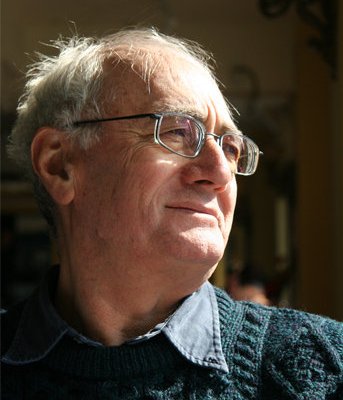
A Lenten reflection from an Australian Columban who spent many years in Mindanao. Ash Wednesday falls early this year, on 13 February. Easter Sunday falls on 31 March. The article originally appeared in The Far East, the Columban magazine in Australia and New Zealand, in March 2012.
Before the great Feast of Easter when we celebrate the death and resurrection of Jesus, the Church goes through a period of preparation by prayer and fasting. We call this Lent. In the northern hemisphere, where Christianity started, it was celebrated in spring and slowly, throughout that time, the dead of winter burst forth into the luxuriance of new growth, signifying life and the resurrection.
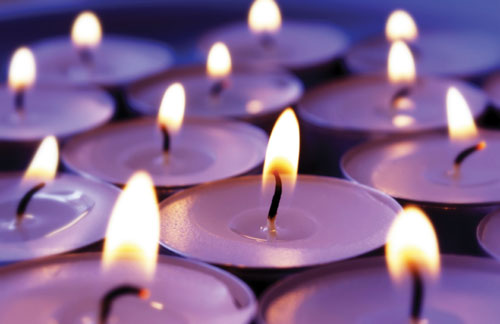
Xiao Ai is a young friend of mine. She was left at the steps of a convent about eight years ago in a remote village of Shan Xi Province, China. She was born with clubbed feet and abandoned. Xiao was brought to Shanghai where a group of foreigners provided money and logistical support for multiple operations.
During that period she was taken in by a family who took great care of her and eventually wanted to adopt her as their own. However there were many hurdles to be overcome. Xiao Ai did not have any identification as the convent was not a registered orphanage and so was not in a position to register her.
Indeed people could only guess at her actual birth date. She was really a ‘non-person’.
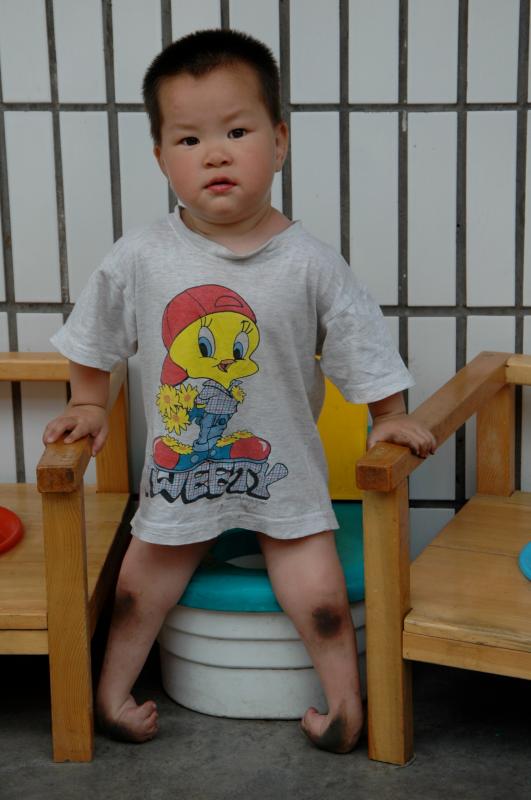
Xiao Ai
After years of effort Xiao Ai has had all her paperwork completed and she now has a Chinese passport that will allow her to travel with her adopted family to Singapore. What happiness followed the long and anxious wait where a wonderful outcome was hoped for rather than expected.
Xiao’s struggle to me is a Lenten story that has become an Easter story; a fast that turned into a feast; a long journey in a desert that ended in freedom; a near death that heralded a resurrection, a new life.
Shanghai is a city of tinsel and glitter. Most people recognize the image of its iconic buildings and towering structures along the Huang Pu River. There are myriad neon signs and a ‘yuppie’ lifestyle for many expatriates who ride the wave of economic frenzy. But it has its under-belly.
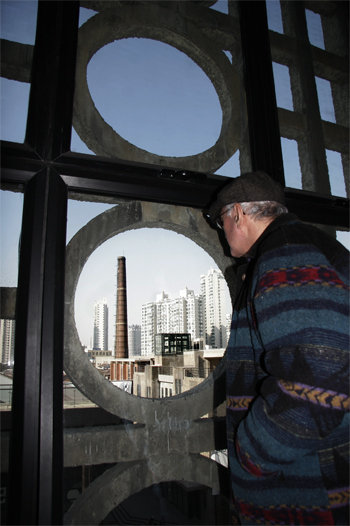
A view on the world of Shanghai.
The construction of this city has been done on the backs of migrant workers - currently seven million - who have travelled to the city to find work. They left their villages and often their families in order to make a little money on construction sites and in restaurants and factories.
These people do not have residency permits in Shanghai and so they cannot settle down where they work. Often they leave their children back in the village in the care of grandparents and may only get home once a year – during the Chinese New Year – to see how the family is going.
Children can resent their absence and may not appreciate the sacrifice of the parent or parents in order to better the whole family economically.
In the cities where they work they do not have equal access to medical and educational opportunities that are open to the local population.

Fr Warren Kinne with Xiao Ai
Their sacrifice is a sort of ‘Lent’ lived in the hope of a better future for their family. Like Xiao Ai’s adopting parents or the migrant parents, they in fact live the admonition of God in Isaiah 58: 6-7: ‘Is not this the fast that I choose: to share your bread with the hungry and bring the homeless poor into your house; when you see the naked, to cover him’.
God brought the slaves out of the land of Egypt where they had made bricks for the ostentatious buildings of the Pharaohs. This same God made a covenant with them and subsequently with us that we might treat each other differently because in one way or another we have all been freed. The worship of the market and the God of money has caused many to suffer. May we all have the courage to live a Lent that will usher in true life for the world.
The author now works with the You Dao Foundation in Hong Kong.
Xiao Ai is singing a song of greeting for the Lunar/Chinese New Year.
Gong Xi Fa Cai
恭喜发财
VICTORIA MALACAPAY ANDAS: A Catechist to the End
By Jayson B. Arcamo
The author, who is based in Bacolod City, works full-time with the Columban Mission Office.
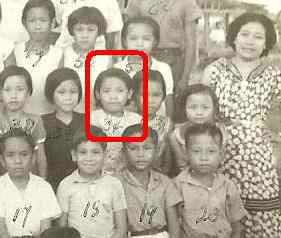 Victoria Malacapay Andas was born on 30 September 1929 in Binalbagan, Negros Occidental, and died on 11 August 2012. She was eighth among the ten children of Justina Rojas Malacapay and Remegio Libo-on Andas who were both public school teachers during the time of Maestro Emong (Geronimo Abada Sr.), the first district supervisor of Kabankalan.
Victoria Malacapay Andas was born on 30 September 1929 in Binalbagan, Negros Occidental, and died on 11 August 2012. She was eighth among the ten children of Justina Rojas Malacapay and Remegio Libo-on Andas who were both public school teachers during the time of Maestro Emong (Geronimo Abada Sr.), the first district supervisor of Kabankalan.
Victoria, while still in high school, started helping her sister Milagros to teach catechism in the Flores de Mayo after World War II. Padre Juan Garcia was the parish priest at that time. She wanted to become a religious sister and joined the Sisters of Charity. After a year as a novice she had to leave for health reasons.
Through the help of the late Columban Fr Thomas Cronin, Victoria enrolled at the University of Negros Occidental and took the two-year Junior Normal General Course leading to the title of Elementary Teacher’s Certificate (ETC) and graduated in March 1962. (The Order of Augustinian Recollects bought UNO in 1962 and changed its name to ‘University of Negros Occidental – Recoletos’ or ‘UNO-R’.) In 1963 Victoria became a Kindergarten teacher and later a Grade One teacher at Kabankalan College (now Kabankalan Catholic College). Three years later she decided to be a full-time catechist in St Francis Xavier Parish.
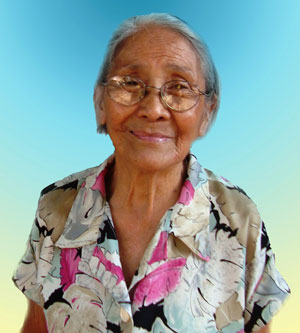
When her sister Milagros died giving birth, Victoria, together with Flora, their youngest sister, took good care of her orphaned nieces, Ana Mae, Aileen, and Milagros Aurea, and of their sister’s stepson Edmundo. Despite the financial difficulties that she and Flora had to face, she never saw looking for ‘greener pastures’ to have a better income for the family as an option. Instead, she took more people in need under her care. Her nieces would often describe their home as the extension house of the parish convent. They recalled that every month, she would offer her home to the ‘novios y novias’ from far flung areas of the parish who had no place to stay the night before the pre-marriage seminar they were required to attend the following day. Her nieces recalled that they had to share their bedrooms on the second floor with the ‘novias’ while all the ‘novios’ slept on the ground floor. Her family remembered that there were even parishioners from Hinoba-an in the far south of the province, victims of land-grabbing, who stayed with them the night before their hearing at the Municipal Trial Court.
Aside from those who spent a night or two with them, there were those whom Victoria took under her wing for months and some even for years. Some were sent to school or were introduced to the Columban priests and became their scholars.
As a catechist, she taught the ‘Hosannistas’ to sing and trained ‘angels’ (little girls) to reciting the Viva La Virgen Easter Sunday morning. Her ‘Hosannistas’ and ‘angels’ always looked forward to their treat of sorbetes (ice cream) and cake, which she solicited from friends, after the ‘Sugat’ and the first Easter Sunday Mass. She did not only catechize the children within the municipality proper of Kabankalan but also young and old parishioners living in the mountainous areas of the parish. She would accompany the Columban priests who celebrated the Holy Eucharist in the far-flung and mountainous areas of the diocese. Carol-an, Basak, Bugtong, Tan-Awan, Saisi, Oringao, Mansumbil were only some of the places she went to with the Columban priests and other catechists during those times. When the diocesan priests took over, Victoria stayed and continued serving the Church. Even in her old age, she would look for sponsors for meals for the catechists, some of whom came on foot under the heat of the sun or in rain for their monthly meetings.

Victoria had been a very loving aunt and grandaunt to her nieces, grand- and great-grandnieces and grandnephews, particularly to her beloved Godfree Anthony, her special grandnephew. Despite her meager pension and allowance, she had never stopped taking care of them to the end. She kept her health problems to herself, never wanting to worry or burden them. She was a very selfless person especially in her desire to serve God. Because of this, she touched the lives of many and even inspired quite a number to help spread God’s goodness.
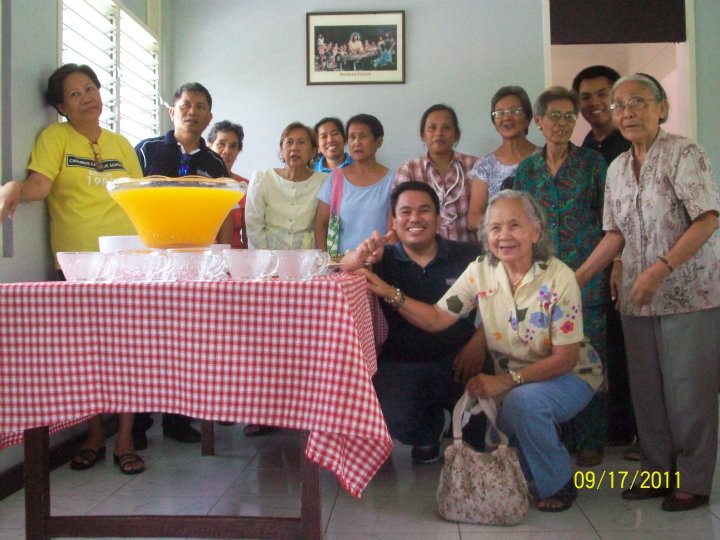
To her family and friends she is a great loss. Her niece shared that it is very difficult for them to accept that she has departed from this world but they also know that their Tyay Vic, as they fondly called her, would never want them or her friends to mourn for her, even less to be sorry for her because death for her wasn’t something to be feared but something to be embraced, for it is the only way to God.
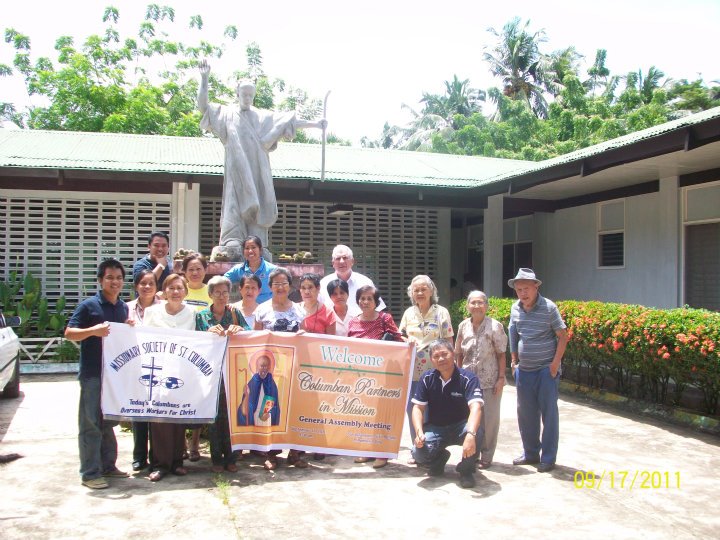
You may contact the author by email at jayson_light@yahoo.com and on Facebook.
When I pray the Our Father
By Maira San Juan
Maira San Juan is from Taytay, Rizal, near Manila, and worked as a Columban Lay Missionary in Korea from 2007 till the end of 2012.
It’s been five years since I arrived in Korea as a Columban Lay Missionary from the Philippines. Since my nine months of language study I have been immersed in ministry with a community of persons with AIDS. On my first day there I felt a mixture of excitement and fear: excitement because it was my first time meeting people living with HIV and I was curious to know how they were coping after learning that they were HIV-positive; fear because at the back of my mind I was thinking I might get the HIV virus through them since we ate at the same table, used the same toilet, talked to each other and so on. But through the years I have been with them, my thinking and feelings have changed, not only about them but also about life, about people, about me and about God. Being a missionary involved in AIDS ministry has helped me to grow not only as a person but also as a woman called by God to be a part of his mission. Throughout my journey, the prayer that has helped me and acquired a new personal meaning is the Lord’s Prayer.
Our Father, who art in Heaven, hallowed be thy name
I grew up in an environment where most people were Catholics. But in Korea most have a different religion from me and have no idea what a Lay Missionary is. There was a time when I chose not to say that I’m a Lay Missionary, not because I had a problem with the term but because I had a hard time trying to explain it. Not only did the Koreans have difficulties understanding the term ‘Lay Missionary’ but so did most of the Filipino migrants I met. The first thing that came to their mind was that either I was a religious or a migrant worker with a missionary visa.
Maira, left, with Losena Biau Duvuwale, a Columban Lay Missionary from Fiji.
At first this made me sad. I felt that Lay Missionaries had no identity of their own, which really frustrated me. When I began to question my frustration, I found deep in my heart a tendency to be attached to a title that can put me on a pedestal. This awareness helped me to remind myself that every time I think of myself as a lay missionary it is through God’s grace and trust that I became an instrument of His love. And because of this it is He who is to be glorified. Whenever someone calls me ‘missionary’ it is not me they recognize but the One who called me on mission.
Thy kingdom come,
thy will be done on earth as it is in heaven
Sometimes I accompany members of the community to hospital. Sometimes I visit communities of migrants and give information about HIV. But most of the time I’m in the community doing household chores. During my first year I experienced confusion because every day I was doing the same chores: cleaning, cooking, and attending to the needs of the patients. I asked myself, ‘What am I doing here? I’m a missionary, not a migrant worker, so why am I cleaning toilets?’ I was so attached to the word ‘missionary’. Time went by and nothing changed. I was still cleaning toilets, doing household chores, doing the laundry. When I got tired of being idealistic about my title as a ‘missionary’ I asked myself again, ‘What am I doing here?’ Then I realized that that is where God helps me to grow.
Some in the community have passed away. Some are now living to the best of their abilities away from the community. In the community people are always coming and going. Many new patients stay only for a short while. When an HIV-positive mother with a newly born baby stayed there was a different dynamic. The presence of the baby gave more life to the community. We were so thankful when the baby’s test result was negative; he was HIV-free.

Then another woman came with a baby who was HIV-positive. I was so happy when the baby arrived. I didn’t felt sorry for him because what I saw was a beautiful healthy baby. When his mother started to give him medicine everyday he would struggle and cry a lot. That was when I felt sorry for him. His tiny body was receiving a lot of strong medicine that he would have to take for the rest of his life.
That was also the time I asked God, ‘If you love your children so much why do you let this one have HIV?’ God didn’t answer. But I was reminded that I’m only a human being, frustrated in not knowing all the things hidden from me. Born with the gift of free will, I can choose and make my own decisions but have no control over the outcome, which means I have no control over things that happen to other people. And I have no idea what God’s plan for them is. Even though He hasn’t answered me, because of all the past experiences in my life, there is one truth I always keep in my heart: God never abandons His children.
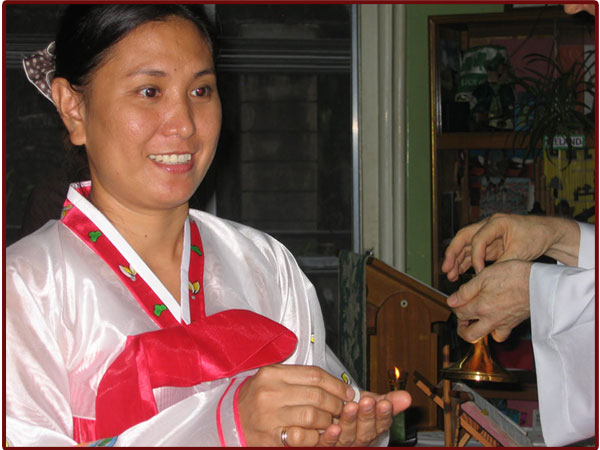
Give us this day our daily bread
Every morning when I open my eyes, the first thought I always have is, ‘I’m not dead!’ Then I say, ‘Thank you God I’m still alive’ followed by the question ‘But why?’ Then little by little I have started to understand that in His grace I always wake up in the morning, and am able to witness the lives of the patients in the community and see the hope in their eyes and I receive a beautiful smile from our beautiful baby, snack foods from patients so willing to share, help from patients who have the energy to participate in household chores, beautiful compliments from patients who never get tired of saying positive things about me.
Then I consider the patients and ask myself how they feel when they wake up. I wonder how they react knowing that they are alive for another day. Are they questioning their continued existence or do they just accept that they are alive but not feeling anything? I’m happy every time I see them in the community gaining their health and energy. But sometimes I feel sorry for them because they need to always take their HIV medicine even when they are tired of taking it. And sometimes because of depression they just stay in their rooms sleeping or hardly talk. Some go out only if it’s their schedule to go to the hospital, because most spend their time in their rooms or watching television.
Then I say to myself, ‘They have a hard life but they still choose not to give up on it’. And every time I witness this it nurtures me and renews my strength to face the new day.
Columban Sister Miriam Cousins and Maira.
Sometimes seeing them at their lowest point makes me so helpless because there is nothing I can do to ease their suffering. This reminds me that all of us have a hunger in our soul that cannot be satisfied. Yes, the community can provide them with a place to stay, food to ease their physical hunger, friendship that can make them feel welcome, but it is still not enough to ease the pain of their own suffering. This has helped me to acknowledge that letting other people experience their own pain makes them discover in their own heart a hope that is continuously flowing from the strength of their own soul. And that’s what nurtures them every day and gives them a reason to face a new day. This is the most important grace every person can receive.
And forgive us our trespasses,
as we forgive those who trespass against us;
and lead us not into temptation,
but deliver us from evil
A continual struggle for me was accepting gifts from patients in the community, not because I’m not comfortable with receiving but because I’m thinking about other patients who have no means to buy things. And I also wondered if patients who gave expected something in return. When they really insist, I receive their simple tokens but always with some hesitation. Sometimes I confuse myself with the way I respond because when I try to see it from their perspective, I see a simple gesture of gratitude for helping them and I see nothing wrong with that. Even when I see it this way I have this feeling that it’s not right. Because of it I try to deny them the opportunity to give me gifts.
But sometimes this results in misunderstandings. Every time they would like to give me something I say ‘no’. When they don’t acknowledge my response and kept insisting I feel hurt and angry because I think that they have crossed a line. But every time I feel like this I don’t say anything. I just ask another person to be a mediator so that the patient will know what I feel, because I can’t say to their face that I’m angry.
Columban lay missionaries Losena and Maira.
And that’s where I have learned to forgive them for hurting my feelings and also to forgive myself for not being brave enough to tell them personally. I’m continually learning from this.
I know that every time I say ‘no’ to their kind gesture I hurt them. But it doesn’t mean that I don’t care or don’t recognize their effort, for I know that they appreciate what I’m doing. It’s always easy to say ‘yes’ because it means not offending others. And it’s really easy to just open my hands and receive everything they give because they are so generous. But I can’t do that. I can’t explain my personal reason to them because it’s rooted in my own beliefs and it is also important for me to protect what I believe in.
Amen.
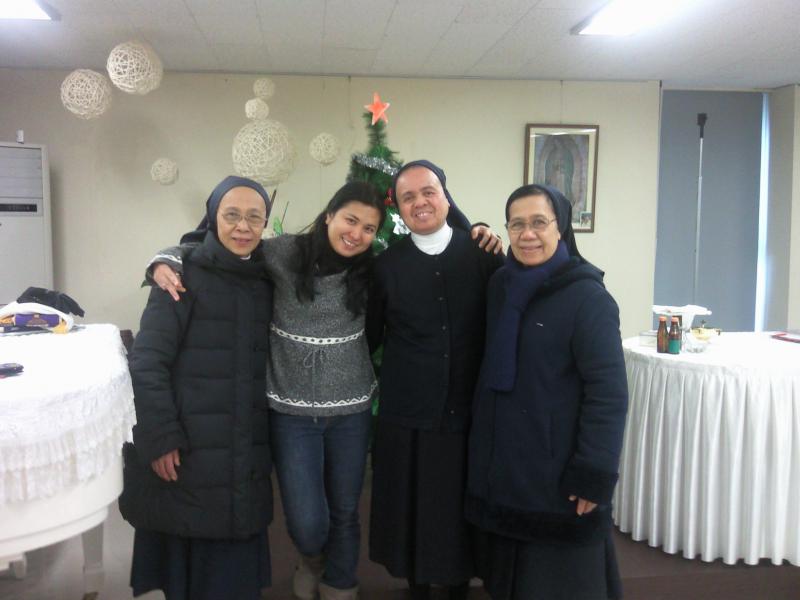
Maira with, left to right, Sr Jesusa D. Villaverde SJBP, (Sisters of Jesus Good Shepherd ‘Pastorelle’), Sr Ester Cecilia DC and Sr Lucia Diasnes DC (Daughters of Charity of St Vincent de Paul). All are from the Philippines.
You may email the author at mesaj85@yahoo.com
Peace By Peace
May God, the source of hope, fill you with joy and peace in the faith, so that your hope may increase by the power of the Holy Spirit (Christian Community Bible).
~ Romans 15:13 ~
Now, a new creature, I in Christ am born,
The old man stripped away; -- I am new-made;
And mounting in me, like the sun at morn,
Love breaks my heart, even as a broken blade:
Christ, First and Only Fair, from me hath shorn
My will, my wits, and all that in me stayed,
I in His arms am laid,
I cry and call –
‘O Thou my All,
O let me die of Love!’
~ Blessed Jacopone of Todi, Franciscan poet (1230 – 1306) ~
So Christ is our peace, and he proclaimed peace to those far away and to those near at hand (cf.Eph 2:14, 17). How could we now do other than pray to him: Yes, Lord, proclaim peace today to us too, whether we are far away or near at hand. Grant also to us today that swords may be turned into ploughshares (Is 2:4), that instead of weapons for warfare, practical aid may be given to the suffering. Enlighten those who think they have to practice violence in your name, so that they may see the senselessness of violence and learn to recognize your true face. Help us to become people ‘with whom you are pleased’ – people according to your image and thus people of peace.
~ Pope Benedict XVI, Midnight Mass Homily, 24 December 2012 ~

Desmond Tutu is the retired Anglican Archbishop of Cape Town, South Africa
At home in South Africa I have sometimes said in big meetings where you have black and white together: 'Raise your hands!' Then I have said: 'Move your hands,' and I've said 'Look at your hands - different colors representing different people. You are the Rainbow People of God.'
~ Desmond Tutu, Sermon delivered in Tromsö, Norway, 5 December 1991 ~
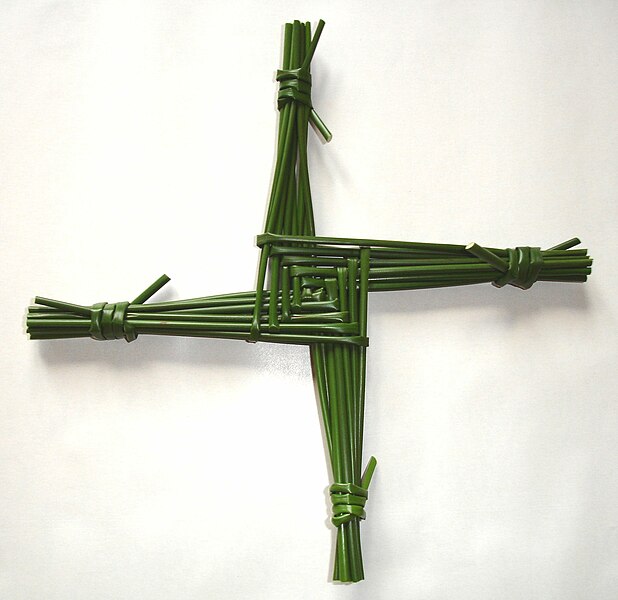
St Brigid’s Cross
I would like the angels of Heaven to be among us. I would like an abundance of peace. I would like full vessels of charity. I would like rich treasures of mercy. I would like cheerfulness to preside over all. I would like Jesus to be present. I would like the three Marys of illustrious renown to be with us. I would like the friends of Heaven to be gathered around us from all parts. I would like myself to be a rent payer to the Lord; that I should suffer distress, that he would bestow a good blessing upon me. I would like a great lake of beer for the King of Kings. I would like to be watching Heaven's family drinking it through all eternity.
~ St Brigid of Ireland, Abbess of Kildare (c. 450 – 525) ~

Catherine de Hueck Doherty
God speaks to us, then, in the duty of every moment. We must ask our Lord to open our eyes so that we might see deeply the need of Christ and his pain in our fellow man. Then, seeing, we arise, no matter what the time or the cost, and we hasten to help, to console, to assuage, Christ’s pain in others.
As we love Christ in our neighbor, everywhere and always, he will draw us unto himself. For our vocation is to be contemplatives, to contemplate God in the depth of our souls. It is given to us to touch him, converse with him, serve him — in others. Christ always comes to us in others.
~ From The People of the Towel and Water by Catherine de Hueck Doherty, Servant of God, 1896 - 1985 ~
‘God Loves You’ – Catherine Doherty
Our Hideaway

A ‘Pilgrimage of Life’
A reaction paper by Mitch Owen Gil G. Ledesma
The author is studying Medical Technology at Colegio San Agustin, Bacolod City (CSA-B).
This year we celebrate the Year of Faith. Because of this we had a ‘Pilgrimage of Life’ on Saturday 1 December 2012. A pilgrimage is a journey of grace, it a spiritual journey of faith towards God. Pope Benedict XVI began his apostolic letter Porta Fidei, announcing the Year of Faith, with these words: The ‘door of faith’ (Acts 14:27) is always open for us, ushering us into the life of communion with God and offering entry into his Church . . . To enter through that door is to set out on a journey that lasts a lifetime’. The ‘Pilgrimage of Life’ made me ask how strong my faith in God is and what I must do in order to serve Him.
During the pilgrimage we visited many churches here in Negros Occidental and I learned a lot about their history. One example is San Isidro Labrador Church in Binalbagan. I learned that that was where the Augustinian missionaries first planted the seed of Christianity and that San Isidro is the Patron of Laborers, a true model of hard work.
After that we continued travelling and had the chance to share our experiences, opinions and views on how we relate our work to our faith and trust in God. Through that, I realized that in everything we do, we should know why we are doing it. We must always bear in mind that God is the source of all our knowledge, wisdom, skill and talents, so we must work through his grace and for his glory.
We also visited St John the Baptist Church in Ilog, St Paul’s Church in Cauayan and St Francis Xavier Cathedral in Kabankalan.
After visiting the different churches, we travelled to Mag-Aso Falls, Kabankalan City, where we had fellowship that strengthened our bonds with our teachers and fellow students, an experience that was both fun and memorable.

The pilgrimage taught me many things. It made me internalize that there is a God who always guides and watches over us in times when we are troubled and in need. I also learned that God is present to us in the struggles of life, and as we journey on our way to him we share comfort and love with one another. This opens the door of faith to his saving grace.
The ‘Pilgrimage of Life’ not only strengthened my bonds with other people, but most of all, it broadened and strengthened my faith and relationship with our Creator and Heavenly Father.

‘Pilgrimage of Life in the Diocese of Kabankalan’
A reaction paper by Maria Gezell T. Taborada
The author is studying Medical Technology at Colegio San Agustin, Bacolod City (CSA-B).
A pilgrimage is a journey to the door of faith. It is a search of moral and spiritual significance. Typically, it is a journey to a shrine or other location of importance to a person’s belief and faith, although sometimes it can be a metaphorical journey into one’s own beliefs.
When I heard about our department’s ‘Pilgrimage of Life’ I was bothered much. Should I join? What popped into my mind was that if I didn’t I’d attend my NSTP (National Service Training Program) class and perhaps regret not joining. But my apprehension was wrong. The pilgrimage was fun and exciting, the day extremely wonderful and worth it.
I got to explore the beauty of nature here in Negros Occidental and how our Father cares for and loves us. We visited different parish churches where the people welcomed us from their hearts. We had the chance to give them a warm round of applause for serving and sacrificing for our kababayans here in Negros. We learned the history of each church and took a look at how they were built.
I had the chance to bond with my schoolmates and teachers of our department in CSA-B. We were able to capture the beauty our country and how we are as persons, how people take care of things and give more importance to them than perhaps we do. We are so thankful and blessed because of what we have right now, our parents, friends, family, and God.
The most memorable part of our pilgrimage was our visit to Mag-Aso Falls. It was the most extravagant moment that I’ve encountered in my life. It would be fun and exciting to go back there and spend my time with my family and friends.
This is what we call pilgrimage: to refresh our minds together and to be together as a community. I had the chance to explore the Falls, where I was tired after climbing and coming back down the stairs twice. But it was fun.
The pilgrimage helped me a lot to realize how Jesus fulfilled his goals for us. Even though it lasted only one day, for me it was a very long journey that I will never forget through my whole life. And it was a long journey of faith.
This was my first step towards fulfilling my goals in life. And it took me hours to realize that not all people here on earth appreciate and seek the beauty of nature and how they are blessed because they are here. I thank the personnel and the teachers who took charge of the pilgrimage. Thank you very much!



